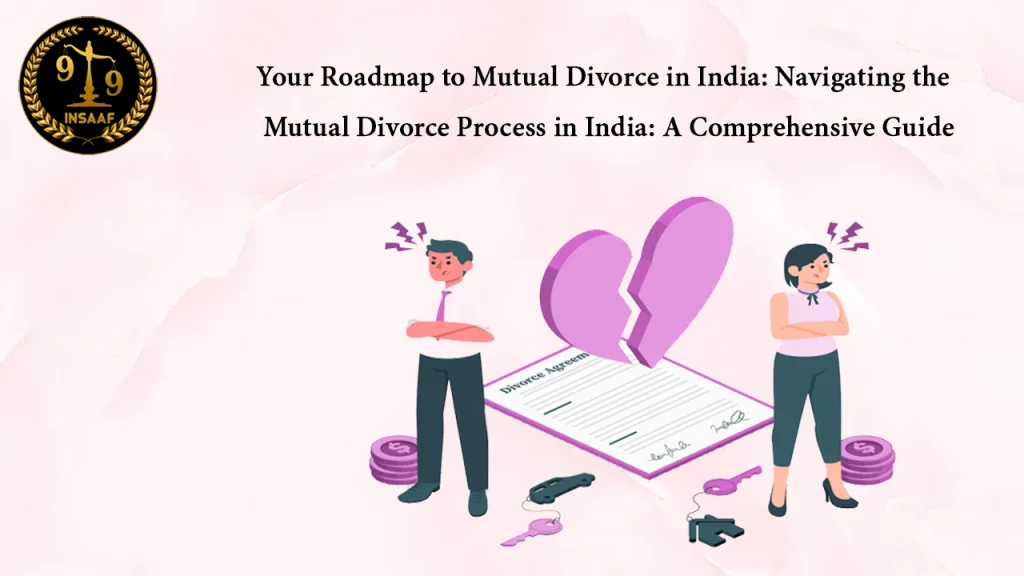

Online Legal Advice from Insaaf99® Online Lawyer Consultation in India


Online Legal Advice from Insaaf99® Online Lawyer Consultation in India

Mutual divorce, often known as 'divorce by mutual consent, is a legal procedure in India that facilitates the amicable dissolution of a marriage without prolonged litigation. This process provides a faster, more harmonious, and cost-efficient method for ending a marriage when both parties are in agreement.
Mutual divorce can be a beneficial option for couples who are mutually interested in ending their marriage. It is a less stressful and time-consuming process than a contested divorce, and it can help to preserve the relationship between the spouses, especially if they have children together.
Let us explore the mutual divorce process in India, elucidating the essential steps and prerequisites involved.
The mutual divorce process in India is regulated by various acts, including the Hindu Marriage Act of 1955, the Special Marriage Act of 1954, and the Parsi Marriage and Divorce Act of 1936, depending on the couple's religion. Regardless of the applicable legislation, the mutual divorce process follows a similar framework.
To qualify for mutual divorce in India, the following conditions must be satisfied:
Obtaining legal guidance is imperative within the context of the mutual divorce process. A proficient attorney will provide expert assistance in navigating the legal intricacies and the essential documentation necessary for a seamless procedure. Moreover, they will offer invaluable insights into the legal ramifications of your choices throughout the divorce proceedings.
A mutual consent petition must be duly signed by both spouses, confirming their mutual intent for divorce. This document comprehensively delineates the conditions of separation, encompassing aspects such as spousal maintenance, child custody, and the equitable distribution of assets. Collaborating with your legal counsel is imperative to ascertain the thoroughness of the petition's content.
The petition must be formally lodged with the relevant family court located in the jurisdiction where either spouse currently resides. This step is of paramount importance, and your legal representative will ensure that you adhere to the court's particular prerequisites for submission.
Following the submission of the petition, the court will usually initiate a six-month cooling-off period aimed at facilitating the possibility of reconciliation. Throughout this duration, both parties reserve the right to make revisions to the agreed-upon terms if necessary. This phase serves as a period of contemplation and fulfills a legal obligation to ensure the parties involved are resolute in their decision.
Upon the conclusion of the cooling-off period, the second motion is submitted. Both spouses are required to attend the final hearing in court. If the court finds the terms and conditions presented in the petition acceptable, it proceeds to grant the divorce decree. This hearing serves as an opportunity for the court to resolve any remaining matters or questions before issuing the ultimate decree.

Once the court issues the divorce decree, the marriage is legally dissolved. However, there are still some post-divorce legal formalities that you need to complete, such as updating your legal documents, bank accounts, and property records to reflect your new marital status. It is important to ensure that you have completed all of these formalities to avoid any legal complications in the future.
In mutual divorce cases, the process is generally straightforward when both parties are amicable and in agreement. Still, it's essential to consider the following factors:
Child Custody: Carefully specify child custody, visitation, and financial support in the petition, prioritizing the child's welfare.
Alimony and Property Division: Define alimony and property division terms meticulously, with guidance from legal and financial experts.
Mutual divorce in India offers couples an amicable and efficient method to end their marriage when both parties are in accord. By adhering to the legal advice and seeking professional counsel, couples can navigate this challenging period with minimal stress and legal entanglements. Understanding the eligibility criteria, engaging a lawyer, drafting the mutual consent petition, and following the court's procedures are fundamental steps in achieving mutual divorce. Additionally, addressing concerns related to child custody, alimony, and property division is essential for a fair and equitable resolution.
Insaaf99, the online legal consultation platform, plays a pivotal role in facilitating mutual consent divorce cases. With its user-friendly interface and experienced legal experts, Insaaf99 simplifies the process for couples seeking an amicable separation. Clients can connect with seasoned family law lawyers who specialize in divorce proceedings, ensuring that all legal requirements are met.
Insaaf99 offers confidential consultations, allowing individuals to discuss their specific case details and concerns. The platform assists in drafting essential documents like the mutual consent petition, ensuring that they comply with legal standards. The expert guidance aids couples in understanding the nuances of child custody, alimony, and property division, helping them make informed decisions.